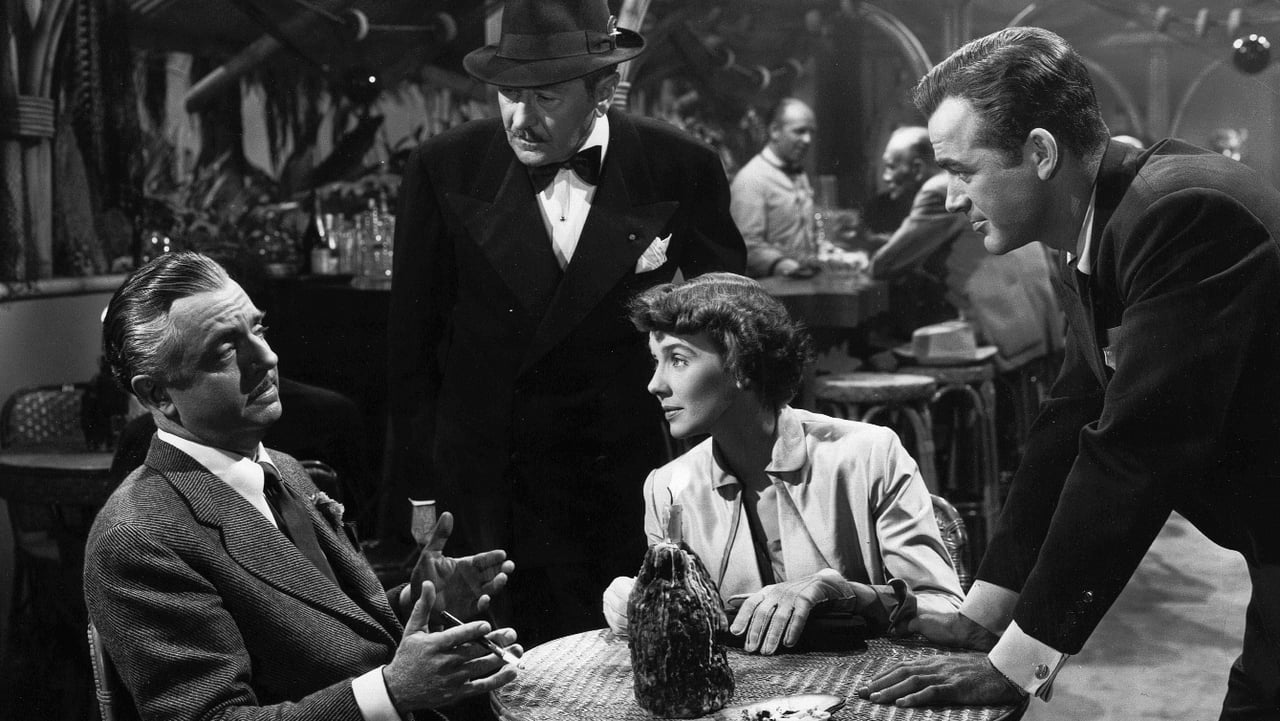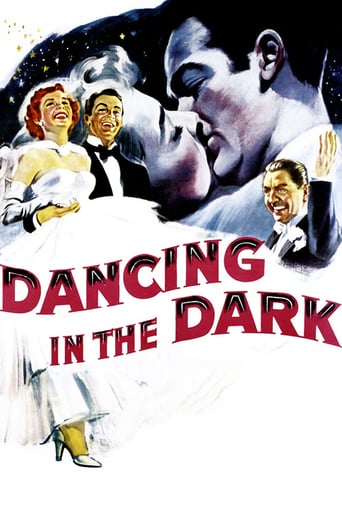



What makes it different from others?
just watch it!
It's fun, it's light, [but] it has a hard time when its tries to get heavy.
View MoreIf you're interested in the topic at hand, you should just watch it and judge yourself because the reviews have gone very biased by people that didn't even watch it and just hate (or love) the creator. I liked it, it was well written, narrated, and directed and it was about a topic that interests me.
View MoreThat's how William Powell's Emory Slade describes his reputation as a temperamental former star who becomes a Hollywood talent scout when 20th Century Fox plans a film version of the 1931 Broadway musical revue "The Band Wagon" (and which MGM later added a story and more of its songs to). Only a few of the Dietz and Schwartz songs are heard here before Fred Astaire and Cyd Charisse danced in the dark, and the storyline here is much darker, too.Powell plays an actor with many personal demons, very much unlike his most famous character of Nick Charles, and even darker than his Broadway mogul, Florenz Ziegfeld. Here, Powell is promoter, not producer, that role being given to the equally legendary Adolph Menjou, while Jean Hersholt (of the Oscar's Humanitarian Award) plays himself as the representative of the Motion Picture Aid Society determined to help the down on his luck but stubborn Powell.As for Betsy Drake as the young ingénue chosen for the lead in the musical, she is certainly lovely, but lacking in superstar magnetism. She is a fine singer and dancer, but I can't believe anybody would buy her as the next Judy Garland or Betty Grable (Cary Grant, maybe, but he married her...) The musical numbers are cut down to two separate segment "auditions"-one live ("New Sun in the Sky"), the other a filmed screen-test that is shown at the Chinese Grauman's where Drake sings and dances the title song and a bit of "I Love Louisa".As a musical, I recommend "The Band Wagon" far more than this, but this is a unique credit in Powell's career, one of his darker dramatic parts, and highly recommended for that. Mark Stevens seems out of place here as Drake's love interest, but there is an amusing cameo by future "Caged" matron Hope Emerson as Powell's gruff landlady.
View MoreBetsy Drake must have been "Dancing in the Dark" in this 1949 film starring William Powell, Mark Stevens, Adolph Menjou and Gene Hersholt. Black and white with not much budget, 20th Century Fox apparently used this movie musical to promote "The Prince of Foxes" (which they also didn't bother to shoot in color) rather than Betsy Drake. Nobody was doing her any favors by putting her in this film.William Powell plays a much hated has-been movie star named Emery Slade. Down on his luck and too proud to accept charity, he convinces Melville Crossman, the head of 20th Century Fox, that he can sign a Broadway star to a contract for a big film (not this one). The star is the daughter of his former show business partner. Fox puts him on as an agent and sends him to New York with a publicist, Bill Davis (Mark Stevens). Bill is in love with an aspiring performer, Julie Clarke (Drake). But she won't marry him until she's had her chance. Unbeknownst to Bill, Julie goes to see Slade to try and get an audition for the movie, not realizing that an item about it in the trade papers isn't really true. Drunk and half asleep, when Emery wakes up and sees Julie, he thinks she's an old girlfriend. There's a good reason for that. Maybe you can guess what it is. He did. Anyway, Emery discourages the Broadway star from taking the role and works with Julie so that Crossman will cast her.There are a couple of problems with this film. The first one is that it looks cheap. The second one is Betsy Drake. A pretty woman, Drake was only a fair actress, a non-dancer and a non-singer. So what is she doing in a musical playing an aspiring musical performer? Good question.William Powell is wasted here, as is Mark Stevens.At the end of the movie, there is a big premiere for "The Prince of Foxes." Crossman's office was apparently a replica of Zanuck's office, and name Melville Crossman was apparently a pseudonym that Darryl F. Zanuck used when he wrote scripts. I hope he didn't write this one.
View MoreIt must the be the saddest thing in the world to have had it all and suddenly see oneself in circumstances below what one once new. This is the case for Emery Slade, the famous luminary of Hollywood we encounter eking out a life while trying to hold to his dignity. In another medium, the change would perhaps not have been the disgrace it presents this forgotten man, but in the fantasy world of the movies, Emery is a has been and his former nasty self stands in the way as others, more generous people, want to help him come out of poverty.Irving Reis, presents us a haughty Emery Slade, a man that is easily hated, as he prepares to redeem himself and make amends of his former life. By the kindness of Jean Hersholt, the famous humanitarian of Hollywood, he is connected to the head of the 20th Century Fox studio, who engages him as a talent scout that is sent to New York to audition possible candidates for the female lead of the upcoming "Brigadoon".Emery is assigned young Bill Davis, who immediately dislikes Slade and his methods. Davis wonders who could have given a job to this man that has no clue as to what has to be done. At the same time, he wants to introduce his former girlfriend, Julie, an aspiring actress and singer, to Slade. Well, he needed not to worry, as Slade meets the young woman on his own and falls under her spell. They both discover how much alike they are. Needless to say, Slade changes for the better in an about face that's hard to believe, but one roots for him and the young Julie.William Powell plays Emery Slade with bravado. He makes us see why this man is so much hated, until he comes to his senses. Mark Stevens is good as the studio handler. Betsy Drake has good chances as the young Julie Clarke. Adolph Menjou plays the studio head.While not one of the best William Powell's vehicles, the film is mildly pleasant. It offers tamed fun whenever Mr. Powell is around.
View MoreWilliam Powell became exceedingly picky about roles late in his career, so it's a mystery why he chose this one. The guise of a conceited, self-centered has-been movie star gives him no chance to show off his finely honed light comedy style, and his character's conversion to a good sport taxes the talents of even this actor. One of several Hollywood-looks-at-Hollywood mid-budget musicals of the year, it's hampered by 20th Century Fox's relentless self-promotion and too few musical numbers. Even the ones that are there are exceedingly modest, perhaps because Betsy Drake is obviously dubbed and no great shakes as a dancer, either. The feeble screenplay presents her as the answer to the Hollywood musical's prayers, but she comes across as a nice kid who probably shouldn't be in movies. A great Schwartz-Dietz stage score gets trammeled; most of these songs were presented to far better effect a few years hence, in MGM's "The Band Wagon."
View More